The Writer Who Destroyed an Evil Empire
How One Book Brought the Soviet Empire to Its Knees
Alexander Solzhenitsyn was “the writer who destroyed an empire.” A fervent communist in the USSR, he believed his ideology would save the world — until his own world shattered when he was sentenced to seven years of hard labor in the Gulag.
It brought him to the brink of death and despair, yet it was this darkness that led him to become one of the brightest minds of the 20th century.
He realized communism was a farce and made it his mission not only to survive the Gulag, but to destroy the USSR’s reputation by any means necessary. The result was his life’s masterpiece — The Gulag Archipelago — a three-volume, 2,500-page account of every horror, perversion, and crime of the empire.
It became an international bestseller, making a global mockery of the Soviet state and permanently delegitimizing Russian communism.
Yet this book was more than a polemic. At its heart, it teaches the secret to resisting any dystopia.
Here’s how to take down an evil empire, according to Solzhenitsyn…
Reminder:
Subscribe to support my mission of restoring Truth, Beauty, Goodness, and God to the heart of the West!
Betrayed by the State
Growing up, Solzhenitsyn was a fervent communist. He loved the USSR, followed Stalin, and believed Russia was leading the fight for utopia and world peace.
He was faithful to the regime even to adulthood, and when World War 2 came, he had no problems enlisting. However, it was on the frontlines of war that he made one grievous mistake:
In a private letter to a friend, he criticized the strategy of Russian generals.
The letter was intercepted, and for this “crime,” against communism, Solzhenitsyn was sentenced to seven years of hard labor in the Gulags.
This shattered Solzhenitsyn’s soul — life in the Gulag was grueling, malnourishment was guaranteed, and many prisoners died. Yet even worse was Solzhenitsyn’s disillusion; his entire ideology was called into question.
Questions swarmed his brain:
How could communism have betrayed him? Was the grand utopia an illusion? Was communism all a lie?
In this abyss of misery, Solzhenitsyn would begin to search for answers. Little could anyone have guessed, however, that this humble search for truth would birth the greatest enemy against the USSR in world history…
Wrath, Despair, and the Lie
In prison, it didn’t take long for Solzhenitsyn to see the USSR’s rot and corruption.
He saw that the Gulag prison system was not about punishing criminals, but about eliminating dissent and supplying slave labor for the nation’s economy. To supply this labor, quotas of prisoners needed to be met, so the state coerced its citizens to falsely accuse each other as “enemies of the state.”
As such, everyone turned on each other — neighbor against neighbor, friend against friend, even children against parents. Life was marked by betrayal, cynicism, paranoia, and hatred for one’s own kin.
When Solzhenitsyn was finally released from prison, he spent his life studying the USSR in secret. He wanted to find the source of this chaos — to find the roots of this dystopia that created a hell on Earth of human hatred.
It took him years of writing, studying, and interviewing former prisoners in secret, but finally, Solzhenitsyn found the source of Russia’s tyranny:
“The Lie.”
He argued that “The Lie” was the lifeline of not just Russian communism, but all dystopias in history. What’s remarkable though, is this “lie,” that Solzhenitsyn discovered ran deeper than a critique of the USSR, its prison system, or even communism itself.
Solzhenitsyn discovered that root of “the lie,” that made communism work was a spiritual illness… an illness corrupting the hearts and souls of the populace:
“In keeping silent about evil, in burying it so deep within us that no sign of it appears on the surface, we are implanting it, and it will rise up a thousand fold in the future. When we neither punish nor reproach evildoers, we are not simply protecting their trivial old age, we are thereby ripping the foundations of justice from beneath new generations.”
Solzhenitsyn didn’t just blame high ranking communist officials for the USSR’s evil — he blamed everyone — because everyone was complicit in the great lie of communism. You didn’t have to be a murderer or a tyrant, you just had to be silent and complacent to be guilty.
The question then, is how do we fight back? How can one soul resist an evil empire?
For him, there was only one true path to resisting tyranny. It’s not easy, but it’s open to all.
Destroy an Empire
Solzhenitsyn’s solution is simple — if lying fuels dystopia, your job is to reject the lies:
“You can resolve to live your life with integrity. Let your credo be this: Let the lie come into the world, let it even triumph. But not through me.
The simple step of a courageous individual is not to take part in the lie. One word of truth outweighs the world.”
He acknowledges the stakes are real. If you refuse to lie, to go along with the agenda of tyranny, you can lose everything — your job, wealth, freedom, even your life. Yet, in losing everything, Solzhenitsyn discovered you gain something richer than all worldly possessions:
Self-mastery, a true freedom rooted in complete surrender to the Good. This, he says, makes you dangerous:
“When you’ve robbed a man of everything, he’s no longer in your power—he’s free again.”
Ironically, the only way to escape torment was to reject the lie. In the USSR, arrest was almost certain, along with coercion to sign a false “confession” and accuse a neighbor.
Yet Solzhenitsyn noticed the rare few who refused — who said, “Kill me if you must, but I refuse to go along with your lie” — were the ones who struck genuine fear into their captors. Interrogators knew such souls were beyond their control and beyond true harm.
This was Solzhenitsyn’s jarring yet beautiful conclusion:
Only when you are willing to lose your life for Truth do you find your destiny and authentic self. And only in this self-discovery do you truly resist tyranny, and begin to live by a truth that restores order to a chaotic and fallen world.
Conclusion
Solzhenitsyn is but a man of paradoxes. He discerned life’s greatest light in the darkest of despair. He tells you that life is found by losing it in love of the Good. And he tells you the Truest life to live is one in which you reject the lies.
Still, even he recognizes his conclusion is no easy task:
“The line dividing good and evil cuts through the heart of every human being. And who is willing to destroy a piece of his own heart?”
Indeed, who is actually willing to die for the Good?
Even if not literal martyrdom, who can muster the strength to embrace truth by any means necessary, even at the cost of your livelihood, stability and freedom?
It’s a sacrifice that appears larger than life, yet Solzhenitsyn insists you have everything to gain for doing so.
Here’s the glory that awaits you, in his own words:
“As soon as you have renounced that aim of ‘surviving at any price,’ then imprisonment begins to transform your former character in an astonishing way. To transform it in a direction most unexpected to you.
And it would seem that in this situation, feelings of malice, the disturbance of being oppressed, aimless hate, irritability, and nervousness ought to multiply. But you yourself do not notice how, with the impalpable flow of time, slavery nurtures in you the shoots of contradictory feelings.
Once upon a time you were sharply intolerant. You were constantly in a rush. And you were constantly short of time. And now you have time with interest. You are surfeited with it, with its months and its years, behind you and ahead of you—and a beneficial calming fluid pours through your blood vessels—patience.
You are ascending…
Formerly you never forgave anyone. You judged people without mercy. And you praised people with equal lack of moderation. And now an understanding mildness has become the basis of your uncategorical judgements. You have come to realize your own weakness—and you can therefore understand the weakness of others. And be astonished at another's strength. And wish to possess it yourself.
The stones rustle beneath our feet. We are ascending…
With the year, armor-plated restraint covers your heart and all your skin. You do not hasten to question and you do not hasten to answer. Your tongue has lost its flexible capability for easy oscillation. Your eyes do not flash over with gladness over good tidings, nor do they darken with grief.
For you still have to verify whether that's how it is going to be. And you also have to work out—what is gladness and what is grief.
And now the rule of your life is this: Do not rejoice when you have found, do not weep when you have lost.
Your soul, which formerly was dry, now ripens with suffering. And even if you haven't come to love your neighbors in the Christian sense, you are at least learning to love those close to you.”
Indeed, the world can take everything from you but your soul — but perhaps the enrichment of your spiritual life is the only real treasure you possess during your time Earth…
And perhaps on the other side of life is a glory beyond human comprehension, waiting for those who chose to not live by lies, but Truth.
Thank you for reading!
Subscribe for free if you would like weekly emails on the Great Books, and their life lessons on Truth, Beauty, and Goodness
And remember:
Paid members receive an additional members only email every week!


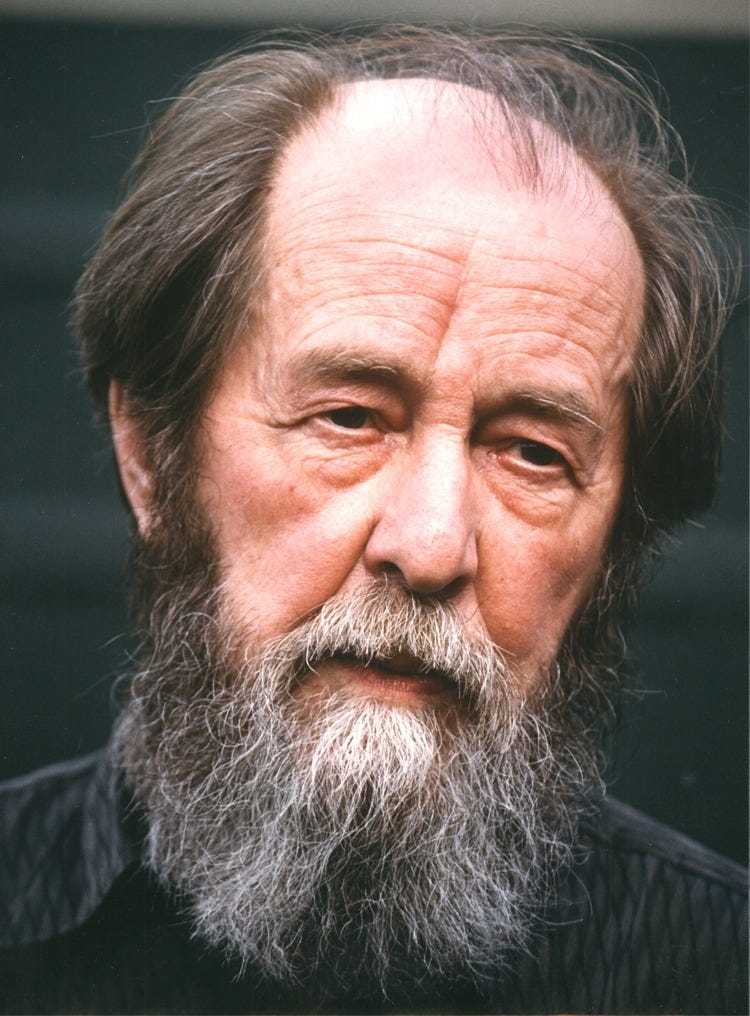
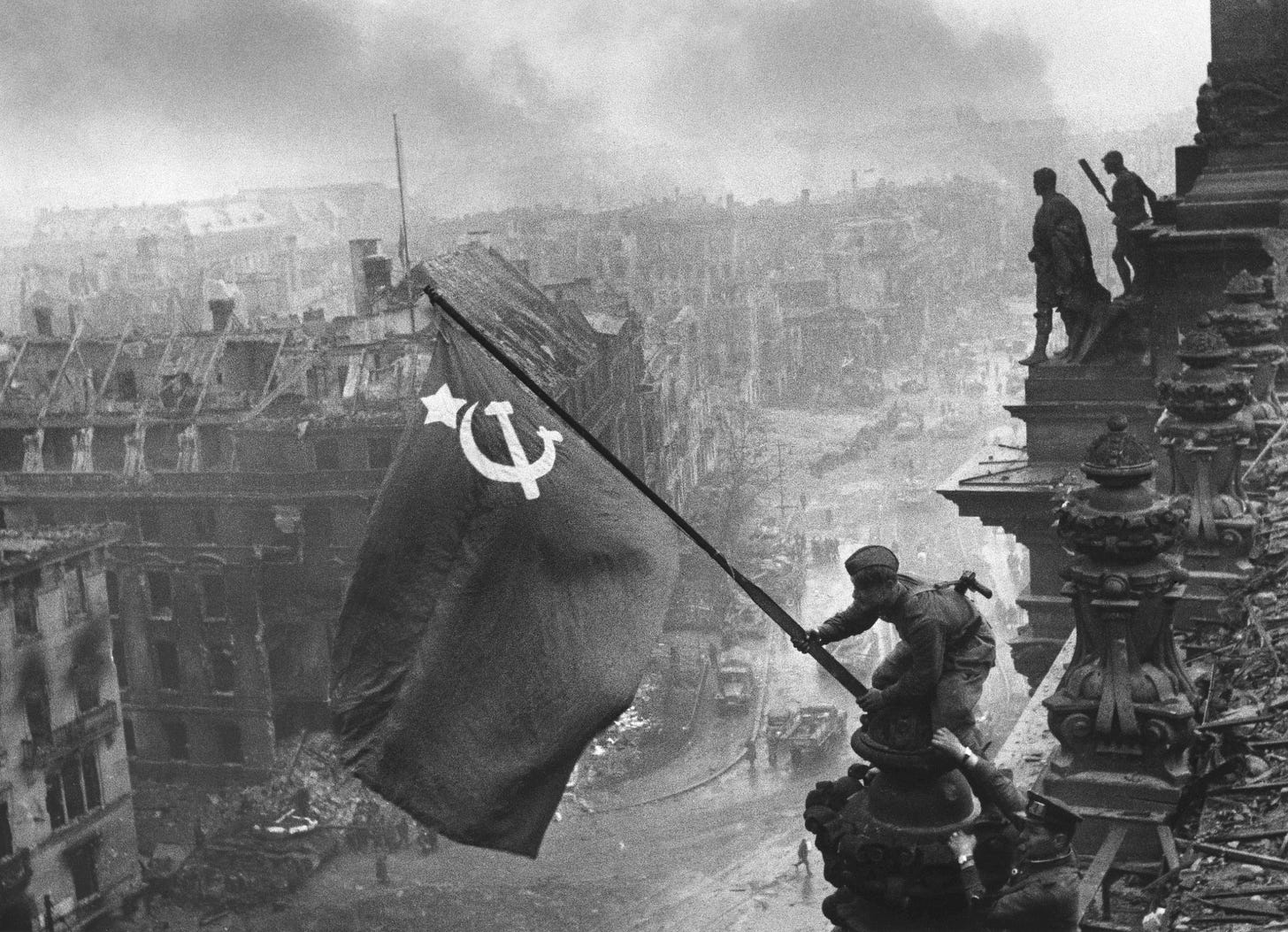
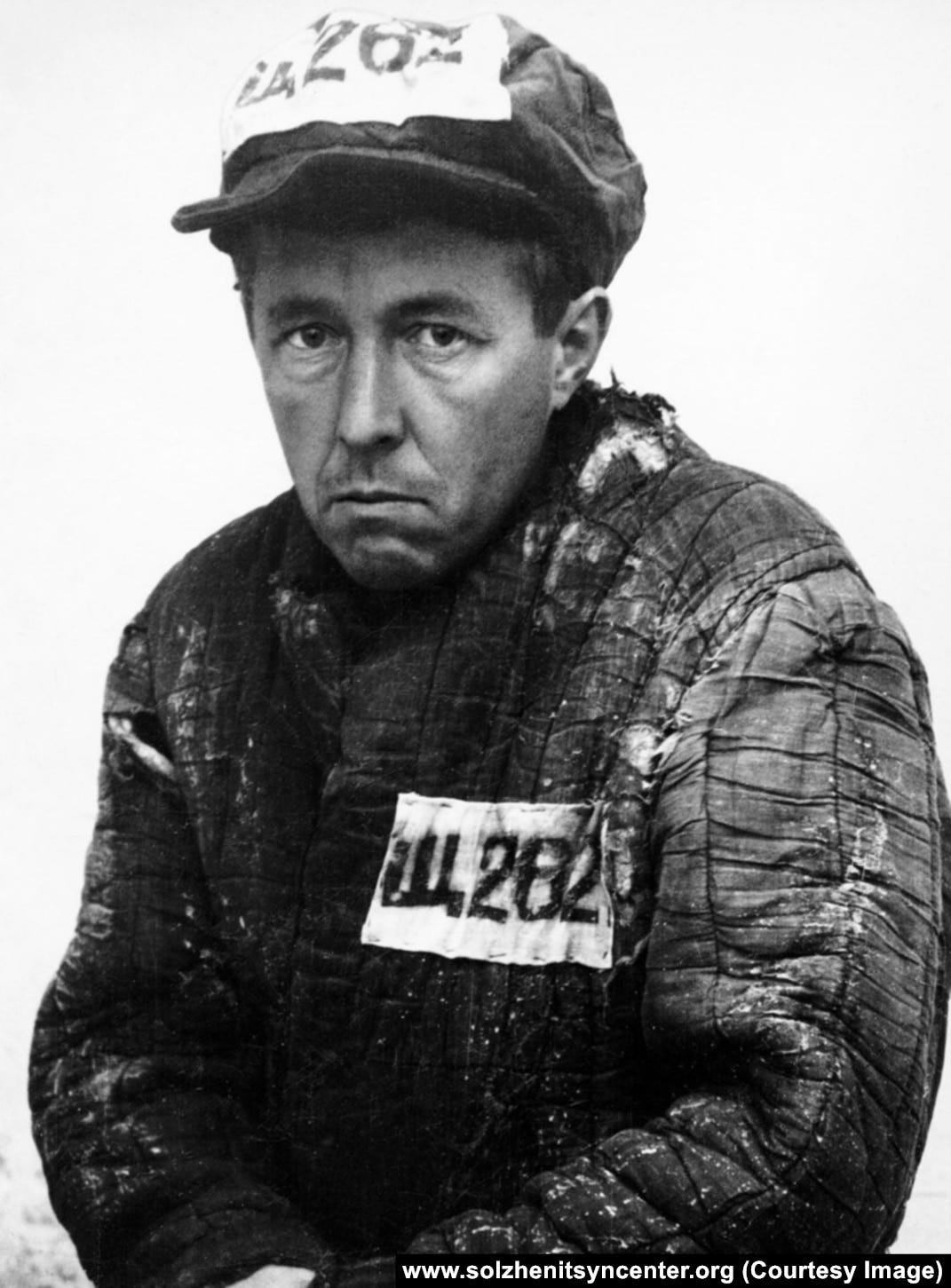
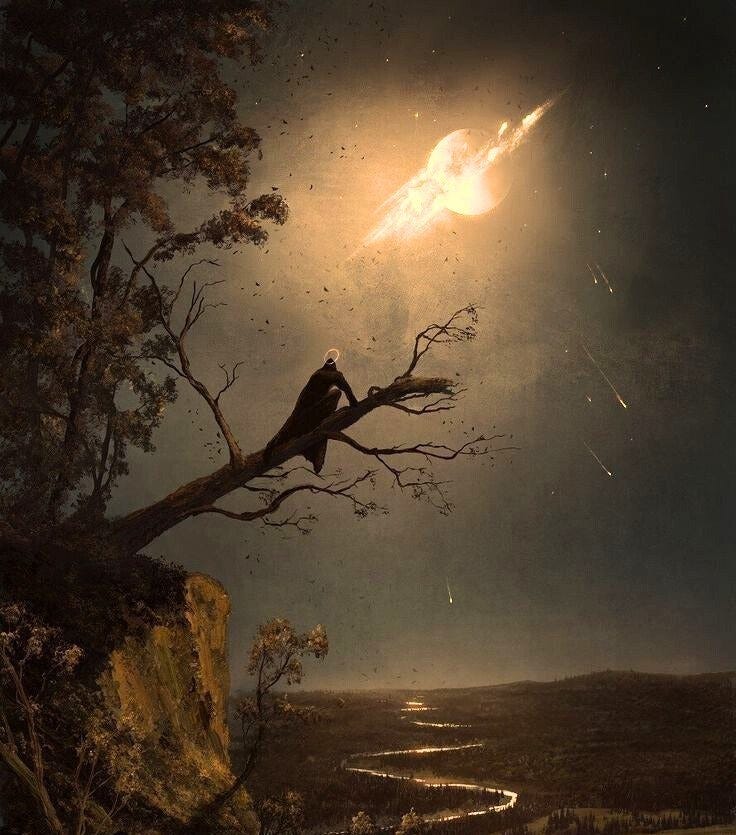
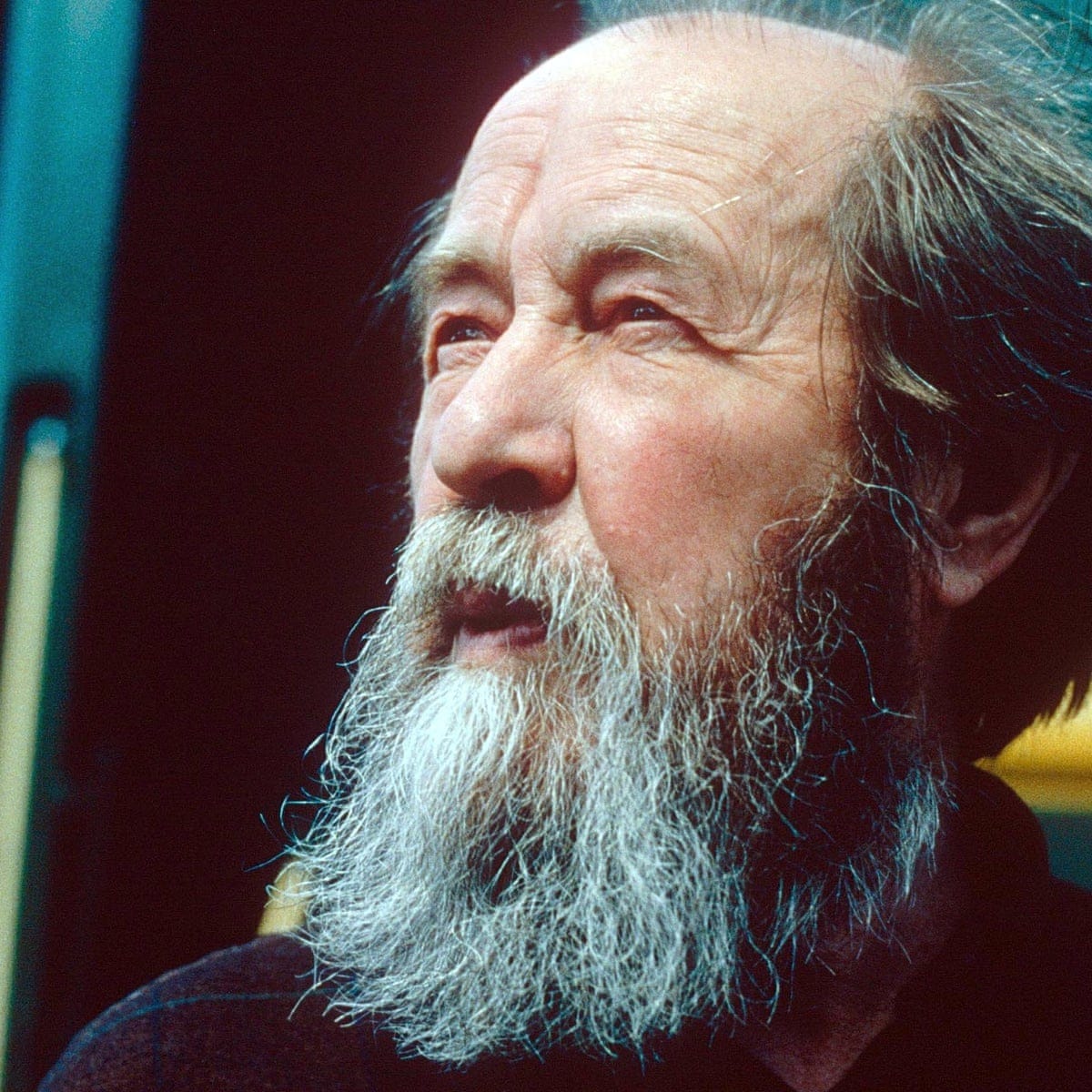
Probably one of the strongest quotes of the 20th century.
“the line dividing good and evil cuts through the heart of every human being"
This is beautifully written,inspiring and a great introduction to a fascinating human being. Thank you.